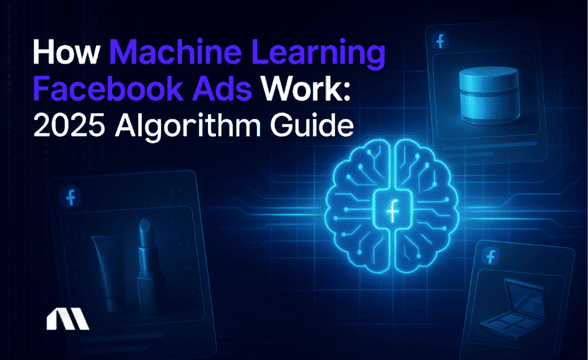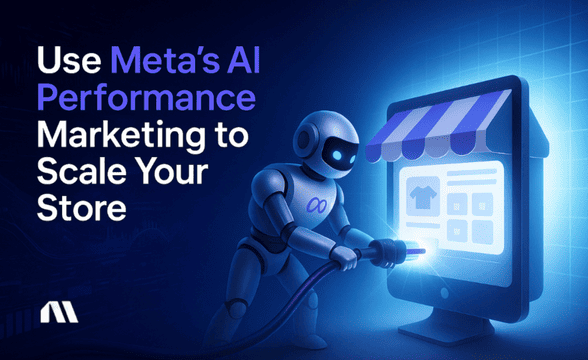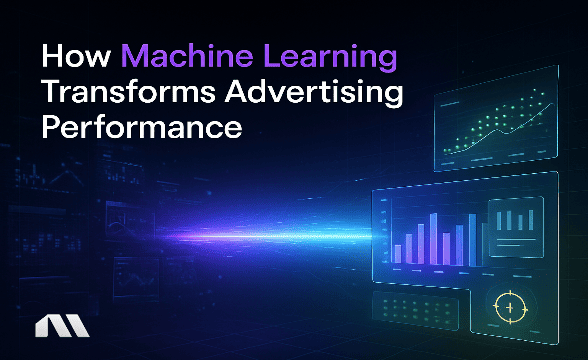Discover how AI machine learning transforms performance marketing with automated optimization, predictive analytics, and ROI improvements. Complete guide.
Picture this: You're staring at your campaign dashboard at 2 AM, manually adjusting bids across 47 ad sets, wondering if there's a smarter way to optimize performance while you sleep. Sound familiar?
You're not alone – thousands of performance marketers are stuck in this endless cycle of manual optimization, constantly chasing the next incremental improvement.
Here's the game-changer: AI machine learning for performance marketing streamlines optimization decisions, predicts customer behavior, and personalizes experiences at scale. According to McKinsey research, businesses implementing machine learning in their marketing operations see 20–30% improvement in sales ROI.
This guide reveals exactly how to implement AI machine learning in your performance marketing strategy. We'll share a proven 90-day roadmap that helps transform manual optimization into more efficient, AI-powered campaign management.
We'll cover everything from real-time data processing to advanced attribution modeling, plus the specific platform integrations that actually move the needle.
What You'll Learn
By the end of this guide, you'll have a complete understanding of how AI machine learning streamlines complex optimization decisions that typically require hours of manual work. We'll walk through a proven 90-day implementation framework with specific milestones and ROI benchmarks.
You'll also discover advanced attribution modeling techniques that address iOS tracking challenges. As a bonus, we'll reveal Meta advertising platform AI features that most marketers never discover – advanced insights that can help improve campaign performance.
The AI Machine Learning Revolution in Performance Marketing
AI machine learning for performance marketing uses algorithms and statistical models to automatically analyze campaign data, predict outcomes, and optimize performance with minimal manual intervention.
Think of it as having a data scientist working on your campaigns around the clock. These systems make thousands of micro-adjustments based on real-time performance signals.
The evolution from rule-based to predictive optimization represents a fundamental shift in how we approach campaign management. Traditional rule-based systems follow simple if-then logic: "If cost per acquisition exceeds $50, pause the ad set."
AI machine learning goes deeper. It analyzes patterns across hundreds of variables to predict which combinations will drive the best results.
Here's a statistic that might surprise you: 69.1% of marketers have integrated AI into their operations as of 2024, according to HubSpot's State of Marketing report. This isn't just a trend – it's becoming the standard for competitive performance marketing.
The core capabilities that make machine learning algorithms so powerful include:
- Pattern Recognition: Identifying successful audience and creative combinations across massive datasets
- Predictive Analytics: Forecasting campaign performance before you spend budget
- Real-Time Optimization: Adjusting bids, budgets, and targeting as performance changes
- Cross-Campaign Learning: Applying insights from one campaign to improve others
- Anomaly Detection: Catching performance issues before they drain your budget
Pro Tip: Start with one campaign type before scaling across your entire account. This allows you to understand how AI machine learning impacts your specific business model and audience behavior.
Real-Time Data Processing: The Competitive Advantage
Here's where AI machine learning really shines – processing thousands of data points per second to make optimization decisions that would take humans hours or days to analyze. While you're sleeping, ML algorithms are analyzing user behavior patterns, adjusting bids based on conversion probability, and reallocating budget to your highest-performing segments.
Traditional attribution modeling relies heavily on last-click attribution, which misses the complex customer journey that leads to conversions. AI machine learning enables multi-touch attribution modeling that tracks every interaction across channels, devices, and time periods.
This gives you a complete picture of what's actually driving results.
Cross-platform data unification becomes crucial when you're running campaigns across Meta, Google, TikTok, and other channels. AI machine learning helps consolidate this data into actionable insights, showing you which channels work best together and how to optimize your overall media mix.
The key is building a robust first-party data collection strategy. With third-party cookies phasing out, your ability to collect and analyze first-party data becomes your competitive moat. AI machine learning amplifies this advantage by finding patterns in your proprietary data that competitors can't access.
Pro Tip: Focus on first-party data collection as third-party cookies phase out. Set up proper tracking infrastructure now, because the quality of your data directly impacts the effectiveness of your AI machine learning optimization.
Personalization at Scale: Beyond Basic Targeting
Dynamic creative optimization represents one of the most powerful applications of AI machine learning in performance marketing. Instead of creating static ad variations, ML algorithms can automatically generate and test thousands of creative combinations.
These systems identify which elements resonate with specific audience segments in real-time.
Audience segmentation using behavioral patterns goes far beyond basic demographics. AI machine learning analyzes micro-behaviors – how long someone spends viewing your product page, which sections they scroll through, their interaction patterns with previous ads.
This creates highly specific audience segments that convert at much higher rates.
Predictive lifetime value modeling helps you identify which customers are worth acquiring at higher costs. By analyzing historical customer data, AI machine learning can predict which new customers will become high-value repeat buyers. This allows you to bid more aggressively for these prospects.
Here's a real example that demonstrates the power: An e-commerce brand implementing automated personalization and optimization achieved a 544% ROI through machine learning-driven campaign management. The key was letting algorithms handle the complex optimization decisions while focusing human effort on strategy and creative direction.
The AI advertising platform approach enables this level of personalization by continuously learning from every interaction, building increasingly accurate models of what drives conversions for your specific business.
Specific Use Cases That Drive Results
Let's get tactical. Here are the specific applications where AI machine learning delivers measurable improvements in performance marketing:
Audience Building with ML Enhancement
Lookalike modeling becomes exponentially more powerful with AI machine learning. Instead of basic demographic matching, ML algorithms analyze behavioral patterns, purchase timing, engagement sequences, and hundreds of other variables.
This finds prospects who truly behave like your best customers.
The process involves feeding your customer data into algorithms that identify the subtle patterns that predict conversion likelihood. This goes beyond what Facebook's standard lookalike audiences can achieve, creating custom audience segments that often outperform platform-native targeting by 20-30%.
Bid Optimization and Budget Allocation
Predictive budget allocation across campaigns eliminates the guesswork from media buying. AI machine learning algorithms continuously monitor performance across all your campaigns, automatically shifting budget from underperforming areas to high-converting segments.
This happens in real-time, meaning your budget optimization never stops. While traditional campaign management might involve weekly or daily budget adjustments, ML systems make these decisions every few minutes based on current performance data.
Creative Testing and Performance Prediction
AI-powered ad generation and performance prediction represent the future of creative optimization. Instead of manually creating ad variations and waiting weeks for statistical significance, AI machine learning can predict which creative elements will perform best before you even launch.
This includes analyzing successful creative patterns across your account history. The system identifies which visual elements, copy styles, and call-to-action phrases drive the highest conversion rates for specific audience segments.
Advanced Attribution Modeling
Multi-touch attribution modeling addresses one of performance marketing's biggest challenges: accurately measuring ROAS across complex customer journeys. AI machine learning tracks every touchpoint, assigning appropriate credit to each interaction that contributes to a conversion.
This is particularly crucial for addressing iOS tracking challenges. While platform attribution becomes less reliable, AI machine learning can use first-party data and behavioral patterns to maintain accurate performance measurement.
90-Day Implementation Roadmap
Here's your step-by-step framework for implementing AI machine learning in your performance marketing operations:
Days 1-30: Foundation Setup and Data Collection
Week 1-2: Infrastructure Setup
- Implement comprehensive tracking across all touchpoints
- Set up first-party data collection systems
- Establish baseline performance metrics for comparison
- Choose your initial test campaign (recommend highest-volume, stable performer)
Week 3-4: Data Integration and Platform Setup
- Connect all advertising platforms to your analytics system
- Set up conversion tracking with proper attribution windows
- Begin collecting sufficient data volume for algorithm training
- Document current manual optimization processes for comparison
Success Metrics: Clean data flowing from all sources, baseline performance documented, tracking validation complete.
Days 31-60: Algorithm Training and Initial Optimization
Week 5-6: Algorithm Implementation
- Launch AI machine learning optimization on test campaign
- Set conservative performance thresholds to prevent overspending
- Monitor algorithm learning phase (typically 7-14 days)
- Compare ML performance against manual optimization control groups
Week 7-8: Optimization and Refinement
- Analyze initial results and adjust algorithm parameters
- Expand to additional campaign types based on early success
- Implement automated reporting for key performance indicators
- Train team on new optimization workflows
Success Metrics: Algorithm completing learning phase, performance matching or exceeding manual optimization, team comfortable with new processes.
Days 61-90: Advanced Features and Scaling
Week 9-10: Advanced Implementation
- Roll out cross-campaign optimization and budget allocation
- Implement predictive audience modeling
- Launch dynamic creative optimization
- Set up automated anomaly detection and alerts
Week 11-12: Full-Scale Optimization
Apply AI machine learning across entire advertising portfolio
- Implement advanced attribution modeling
- Launch predictive lifetime value optimization
- Establish ongoing optimization and monitoring procedures
Success Metrics: 10-20% improvement in overall ROAS, reduced manual optimization time by 70%+, AI-assisted systems handling majority of optimization decisions.
The autonomous marketing manager concept becomes reality during this final phase, where algorithms handle most optimization decisions while you focus on strategy and creative direction.
Pro Tip: Don't rush the learning phases. Algorithms need time to collect sufficient data and identify patterns. Premature manual interventions can reset the learning process and delay optimal performance.
Platform-Specific Implementation Strategies
Meta Advertising AI Features and Optimization
Meta's advertising platform offers several AI machine learning features that most marketers underutilize. Advantage+ campaigns use machine learning to automatically find your best audiences, while dynamic creative optimization tests thousands of ad combinations to identify top performers.
The key is understanding how to work with these algorithms rather than against them. This means providing sufficient creative variety, setting appropriate campaign objectives, and allowing adequate learning time before making manual adjustments.
Madgicx's AI Marketer takes this further by adding an additional layer of optimization on top of Meta's native features. While Facebook optimizes within individual campaigns, Madgicx optimizes across your entire account, making budget allocation decisions and identifying scaling opportunities that platform-native tools miss.
You can try Madgicx’s AI for free.
Google Ads Smart Bidding Integration
Google's Smart Bidding uses AI machine learning to optimize for conversions or conversion value in real-time. The key to success is providing high-quality conversion data and setting appropriate target ROAS or target CPA goals based on your business objectives.
Integration with Google Analytics 4 becomes crucial for accurate performance measurement. AI machine learning algorithms need clean, comprehensive data to make optimal bidding decisions.
Cross-Platform Attribution Setup
The real power emerges when you implement AI machine learning across multiple advertising platforms simultaneously. This requires sophisticated attribution modeling that tracks customer journeys across Meta, Google, TikTok, and other channels.
ROAS prediction platform capabilities become essential for managing multi-platform campaigns effectively. Instead of optimizing each platform in isolation, AI machine learning helps you understand how channels work together to drive conversions.
Overcoming Common Challenges and Future Outlook
Data privacy compliance addresses one of the biggest concerns for performance marketers. According to recent surveys, 41% of CMOs cite data privacy as their top challenge when implementing AI marketing solutions.
The solution involves building robust first-party data collection systems that comply with GDPR, CCPA, and other privacy regulations while still providing the data quality needed for effective AI machine learning optimization.
Integration with existing marketing stacks requires careful planning. Most performance marketers use multiple tools for different aspects of campaign management. AI machine learning platforms need to integrate seamlessly with your current workflow rather than requiring complete system overhauls.
Setting realistic expectations and timelines is crucial for success. AI machine learning isn't magic – it requires quality data, proper setup, and time to learn your specific business patterns. Most algorithms need 2-4 weeks to complete their learning phase before delivering optimal results.
Looking ahead to 2025, predictive analytics and autonomous campaign management represent the next evolution. The AI marketing sector is projected to reach $40 billion by 2025, driven primarily by performance marketing applications.
We're moving toward a future where machine learning in marketing handles most optimization decisions with minimal manual intervention. Human marketers will focus on strategy, creative direction, and business growth initiatives.
The trend toward performance marketing AI will accelerate as platforms improve their machine learning capabilities and marketers become more comfortable with AI-assisted optimization.
Another significant trend is the rise of AI-powered content creation. 77% of marketers are using AI to create personalized content, moving beyond basic dynamic insertion to truly customized messaging based on individual user behavior patterns.
Pro Tip: Stay ahead of the curve by experimenting with emerging AI features on your advertising platforms. Early adopters often gain significant competitive advantages before these features become widely adopted.
Frequently Asked Questions
How long does it take to see results from AI machine learning implementation?
Most AI machine learning algorithms require 7-14 days to complete their initial learning phase, with performance improvements becoming visible within 2-4 weeks. However, the full benefits of AI machine learning optimization often take 60-90 days to materialize as algorithms accumulate more data and refine their predictions.
The timeline depends heavily on your data volume and campaign complexity. High-traffic campaigns with substantial conversion data will see results faster than smaller accounts with limited historical data.
What's the minimum data requirement for effective ML optimization?
For effective AI machine learning optimization, you typically need at least 50 conversions per week per campaign, though 100+ conversions provide better algorithm training. This data requirement is why starting with your highest-volume campaigns makes sense.
If you don't have sufficient conversion volume, consider optimizing for micro-conversions (email signups, add-to-cart events) that occur more frequently while building toward your primary conversion goals.
How does AI machine learning handle iOS 14.5+ attribution challenges?
AI machine learning helps address iOS tracking limitations by using first-party data and behavioral pattern analysis to maintain accurate attribution. While platform-reported data becomes less reliable, ML algorithms can identify conversion patterns and predict customer behavior using available data signals.
The key is implementing robust first-party data collection and using AI machine learning platforms that specialize in attribution modeling under privacy-restricted conditions.
Can small businesses benefit from AI machine learning for performance marketing?
Absolutely. While large enterprises have more data to work with, small businesses can benefit significantly from AI machine learning optimization. Many platforms now offer ML features accessible to smaller advertisers, and the automation benefits are often more pronounced for businesses with limited manual optimization resources.
The key is starting with platforms that offer built-in AI machine learning features (like Meta's Advantage+ campaigns) before investing in more sophisticated third-party solutions.
What's the ROI difference between ML and traditional optimization?
Based on industry data, businesses implementing AI machine learning in their marketing operations typically see 20–30% improvement in sales ROI compared to manual optimization methods. However, results vary significantly based on implementation quality, data volume, and campaign complexity.
The ROI improvement comes from both performance gains and time savings. While AI machine learning might improve campaign performance by 15%, it often reduces manual optimization time by 70%+, allowing marketers to focus on higher-value strategic activities.
Start Your AI Machine Learning Journey Today
AI machine learning for performance marketing represents the future of digital advertising, offering AI-powered optimization capabilities that help deliver consistent results while reducing manual workload. The implementation framework we've outlined provides a proven path from manual optimization to AI-assisted campaign management.
The key takeaways for your AI machine learning implementation include: starting with high-volume campaigns to ensure adequate data for algorithm training, focusing on first-party data collection to maintain attribution accuracy, and allowing sufficient time for algorithms to learn your specific business patterns.
Your next step is clear: begin with one high-performing campaign and gradually expand your ML implementation using the 90-day roadmap. This approach minimizes risk while maximizing learning opportunities.
Tools like Madgicx's AI Marketer make this transition seamless by handling the technical complexity while you focus on strategy and growth. The platform's AI-powered optimization capabilities mean your campaigns can improve continuously, with minimal manual oversight required.
The future of performance marketing is AI-assisted, predictive, and profitable – and it starts with your next campaign optimization. The marketers who embrace AI machine learning now will have a significant competitive advantage as these technologies become standard practice.
Don't wait for your competitors to gain the AI machine learning advantage. The data you collect today becomes the foundation for tomorrow's optimization success.
See how Madgicx's AI Marketer provides AI-powered Meta ad optimization recommendations for your campaigns around the clock, reducing manual bid adjustments and designed to help improve ROAS performance. Join thousands of performance marketers who've streamlined their optimization workflows for better results.
Digital copywriter with a passion for sculpting words that resonate in a digital age.







.avif)







